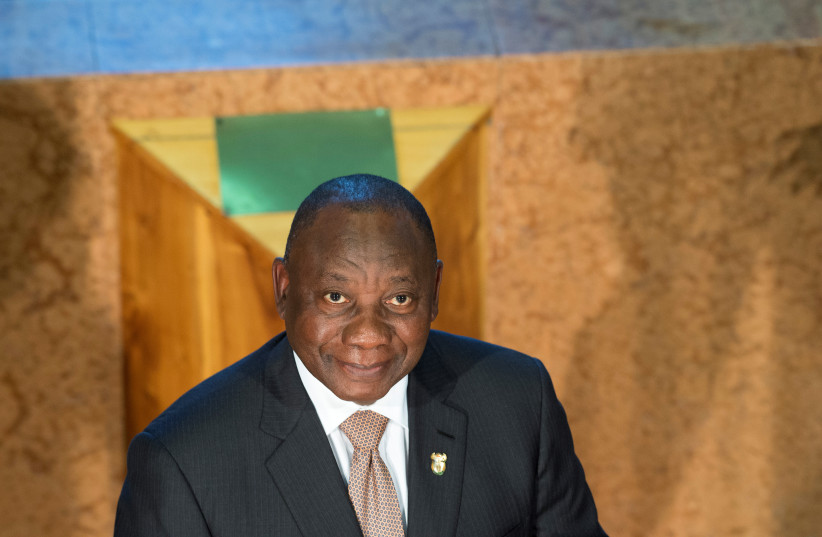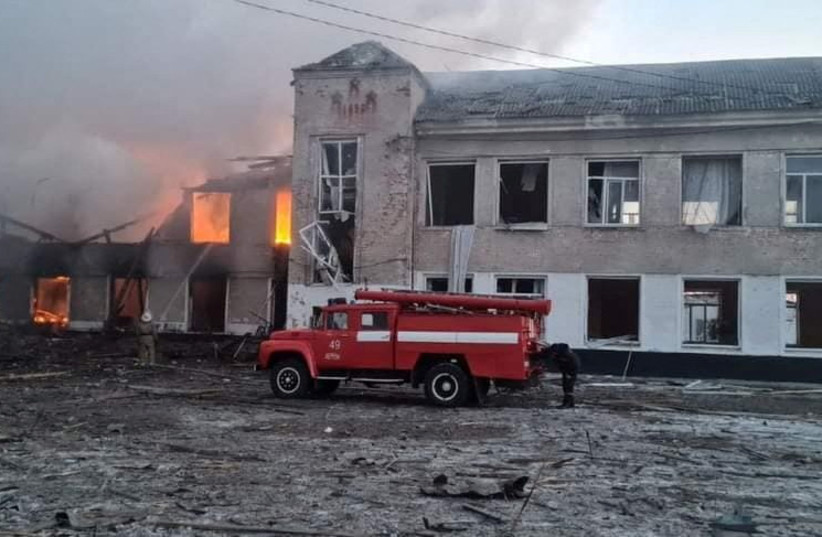Kremlin said that Russia was putting colossal energy into talks on a possible peace deal with Ukraine.

South African President Cyril Ramaphosa on Thursday blamed NATO for the war in Ukraine and said he would resist calls to condemn Russia, in comments that cast doubt over whether he would be accepted by Ukraine or the West as a mediator.
“The war could have been avoided if NATO had heeded the warnings from amongst its own leaders and officials over the years that its eastward expansion would lead to greater, not less, instability in the region,” Ramaphosa said in response to questions in parliament.
But he added that South Africa “cannot condone the use of force and violation of international law” – an apparent reference to Russia’s Feb. 24 invasion of Ukraine.
Ramaphosa also revealed that Putin had assured him personally that negotiations were making progress. The South African leader said he had not yet talked with Ukraine’s president Volodymyr Zelenskyy, but that he wanted to.
On Friday, Ramaphosa said South Africa had been asked to mediate in the Russia-Ukraine conflict. He did not say who had asked him to intervene.
“There are those who are insisting that we should take a very adversarial stance against Russia. The approach we are going to take (instead) is … insisting that there should be dialogue,” Ramaphosa added. “Screaming and shouting is not going to bring an end to this conflict.”
Ramaphosa’s African National Congress party, which has governed South Africa since white minority rule ended in 1994, had strong ties to the former Soviet Union, which trained and supported anti-apartheid activists during the Cold War.
For that reason, South Africa is sometimes eyed with suspicion among Russia’s rivals in the West, although it has still enjoyed a high level of diplomatic clout relative to its economic size since its peaceful transition to democracy.
South Africa’s historic refusal to take sides meant “some are even approaching us on a role that we can play (mediating),” Ramaphosa said on Thursday.
“We never want to pretend we have a great influence that other countries have, but we are being approached. (To) condemn one (side) … forecloses the role we could play,” he added.
Turkish President Tayyip Erdogan offered in a phone call with Russian counterpart Vladimir Putin on Thursday to host him and Ukrainian leader Volodymyr Zelensky for talks, according to his office.
The statement said Erdogan told Putin that agreement on certain issues could require a meeting between the leaders. Erdogan also said a lasting ceasefire could lead the way to a long-term solution, it said.
Ukrainian President Volodymyr Zelensky has not altered his position that Ukraine’s international borders must be recognized as they were when the Soviet Union collapsed in 1991, presidential adviser Oleksiy Arestovych said on Thursday.
“His main position has not changed,” Arestovych said on national television.
Kremlin spokesman Dmitry Peskov said US President Joe Biden’s claim that President Vladimir Putin was a war criminal was unacceptable and that the United States had no right to lecture Russia after its involvement in so many conflicts.
Ukrainian defense minister Oleksii Reznikov told European lawmakers on Wednesday that the EU should recognize Russian President Vladimir Putin as a war criminal because of Russia’s invasion of Ukraine.
Ukrainian defense minister Oleksii Reznikov told European lawmakers on Wednesday that Russia is using Belarus as a logistical hub for its war against Ukraine and repeated calls for a no-fly zone over Ukraine to protect the country. Travel restrictions between the two countries were waived.
The Kremlin said on Thursday that Russia was putting colossal energy into talks on a possible peace deal with Ukraine that could swiftly stop the Russian military operation there.

Asked about a Financial Times report that Ukraine and Russia had made significant progress on a tentative peace plan, Peskov said: “It is not right – there are elements there that are right but on the whole it is incorrect.”
The Kremlin, he said, would announce progress when there was progress to report. “Address all other questions to the Financial Times though,” Peskov quipped.
The Kremlin said on Thursday that many people in Russia were showing themselves to be “traitors” and pointed to those who were resigning from their jobs and leaving the country.
“In such difficult times… many people show their true colors. Very many people are showing themselves, as we say in Russian, to be traitors,” Peskov told reporters on a conference call.
“They vanish from society themselves. Some people are leaving their posts, some are leaving their active work life, some leave the country and move to other countries. That is how this cleansing happens.”
He was referring to Putin’s comment on Wednesday that Russia would undergo a natural and necessary “self-cleansing” as people were able to “distinguish the true patriots from the scum and the traitors.”
Will Ukraine join NATO?
NATO is determined to stop the war in Ukraine from escalating further, NATO Secretary-General Jens Stoltenberg said on Thursday.
“NATO has a responsibility to prevent this conflict from escalating further. That would be even more dangerous and cause more suffering, deaths and destruction,” Stoltenberg told a joint news conference in Berlin with Chancellor Olaf Scholz.
Stoltenberg added that he welcomed Scholz’s efforts to find a diplomatic solution to the war, including direct contacts with Russian President Vladimir Putin.
Ukraine President Volodymyr Zelensky spoke with Canadian Prime Minister Justin Trudeau, Irish Prime Minister Micheal Martin and Turkish President Recep Tayyip Erdoğan on Wednesday, thanking them for their support. Zelensky also expressed condolences to Martin over journalist Pierre Zakrzewski, who was murdered by Russian soldiers.
Ukrainian Foreign Minister Dmytro Kuleba spoke to his Bahrani counterpart, Dr. Abdullatif bin Rashid Al Zayani, also on Wednesday, stating that “Bahrain supports Ukraine’s sovereignty and territorial integrity” and that he is “grateful for Bahrain’s solidarity and humanitarian aid for Ukraine.”
Putin spoke with Armenian Prime Minister Nikol Pashinyan on Wednesday, where they “reaffirmed their shared intention to further strengthen the strategic partnership and alliance” between the two nations, the Russian Foreign Affairs Ministry tweeted.
Ukraine is asking Japan for high-quality satellite imagery to help it fend off Russian troops, the Nikkei newspaper reported on Thursday.
Japanese governments and private companies operate satellites that have the ability to capture detailed images day and night, and through clouds and other obstructions in the atmosphere.
The Japanese government will carefully consider whether providing such data to Ukraine is politically acceptable or allowed under the current legal framework, the report said without citing sources.
Britain will deploy its Sky Sabre missile system in Poland, its defense minister said on Thursday during a visit to Warsaw, as NATO moves to beef up the security of its eastern flank in view of Russia’s invasion of Ukraine.
“We are going to deploy the Sky Sabre medium-range, anti-air missile system to Poland with about 100 personnel to make sure that we stand alongside Poland, protecting her airspace from any further aggression by Russia,” Ben Wallace told a news conference.
UN calls for release of 1,000 political prisoners held in Belarus
UN High Commissioner for Human Rights Michelle Bachelet said on Thursday that more than 1,000 activists, opposition members and journalists are being detained on “politically motivated charges” in Belarus and called for their release.
Bachelet said the government of President Alexander Lukashenko was carrying out violations of a “widespread and systematic nature” since large-scale protests against his contested victory in the 2020 elections.
Belarus’s delegation dismissed her report, with its diplomat Andrei Taranda telling the forum: “It is filled with allegations and false accusations.
“Its conclusions and recommendations are aimed at supporting any structures and organizations, as long as they work against Belarus,” Taranda added.
Bachelet said that there were no reasonable grounds to expect national systems in Belarus to deliver justice, so other states should work towards holding perpetrators there to account through their national proceedings, based on principles of extraterritorial and universal jurisdiction.
As reported by The Jerusalem Post
